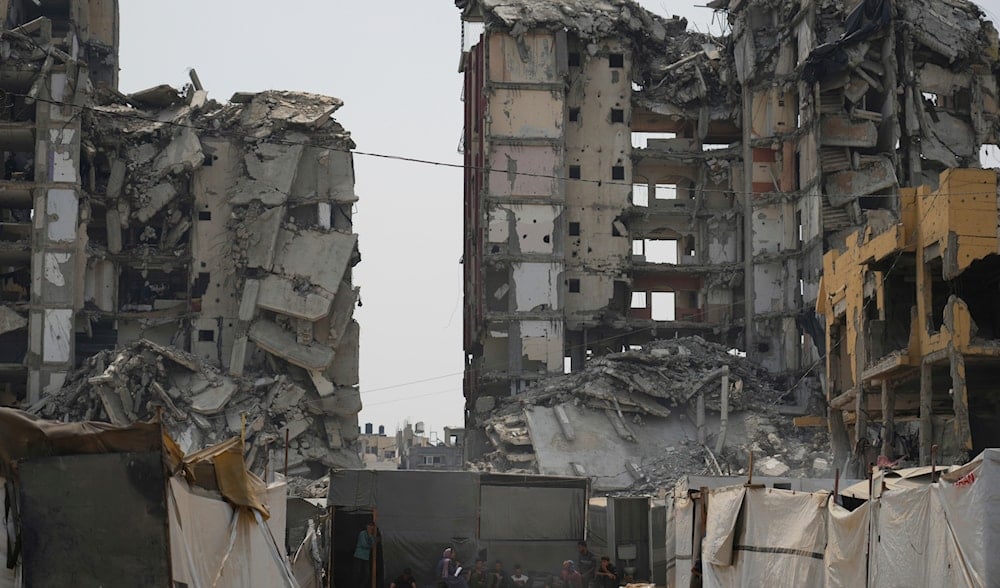Why the current US strategy is failing in West Asia: NI
Leon Hadar of the National Interest analyzes why the current US Gaza policy and West Asia strategy fail to deliver results.
-

A group of Palestinians sit in the shade of their tent amid destroyed buildings on a hot summer day in Gaza City, Tuesday, Aug. 12, 2025. (AP Photo/Jehad Alshrafi)
As ceasefire negotiations between the Palestinian Resistance and "Israel" continue to falter, with the United States pulling its negotiating team from Qatar, a familiar pattern emerges in the US' West Asia diplomacy. Leon Hadar, a Senior Fellow at the Foreign Policy Research Institute, argues in The National Interest that this cycle exposes deep-rooted flaws in US Gaza policy and American West Asia strategy.
At the core of Hadar's critique lies a fundamental contradiction in US foreign policy in West Asia: the US presents itself as a neutral mediator between "Israel" and the Palestinian Resistance while providing unconditional political and military backing to one side.
This raises a key question: how can Washington be an honest broker while vetoing UN Security Council resolutions for a permanent ceasefire and supporting Israeli military operations without conditions?
For Hadar, this reflects a deeper strategic confusion about the US' role in global affairs, not tactical inconsistency. The belief that every regional conflict demands an American solution, and that these solutions are inherently superior to local alternatives, has repeatedly led US diplomacy into dead ends.
Gaza ceasefire talks and the illusion of control
Hadar emphasizes that US policymakers still operate under outdated assumptions about their influence. The failure of Gaza ceasefire talks in Doha illustrates that the US is no longer the decisive force in shaping events in the region, a hard truth Washington resists.
This is clear when comparing the perspectives of the combatants with the frameworks of US negotiators. For the Resistance, survival after months of warfare while retaining a presence in Gaza is itself a form of victory, regardless of material losses.
Meanwhile, US diplomacy focuses on detailed timelines, such as 60-day captives release schedules, which reflect bureaucratic priorities rather than the existential stakes driving the Resistance fighters.
Regional solutions should be prioritized
Placing the war on Gaza in a broader security context, Hadar argues that cyclical violence stems from structural regional problems that US policy often ignores. Temporary truces followed by renewed fighting are more than symptoms of the Israeli occupation of Palestine, but of Washington’s inability to create sustainable regional frameworks, according to Hadar.
The normalization accords, he notes, showcased what US diplomacy can achieve with strategic clarity, allowing Arab-Israeli normalization without resolving the Palestinian question. Yet, the ongoing war on Gaza reveals the limits of that approach, as unresolved disputes continue to fuel instability.
Hadar proposes shifting toward what he calls “strategic realism” in US Gaza policy and broader West Asia strategy. This involves three major changes.
The first involves empowering regional actors, like Egypt, Jordan, Saudi Arabia, and Turkey, to take the lead in Palestinian governance and reconstruction. The second change includes building economic partnerships between Palestinians and neighboring Arab states to reduce reliance on Israeli and international aid, fostering long-term stability. And third, Hadar thinks the US should concentrate diplomatic resources on situations where Washington has real leverage and strategic interest.
The cost of strategic incoherence
Hadar believes that the current US approach, which combines unconditional military support for "Israel" with rhetorical calls for humanitarian restraint, satisfies neither strategic logic nor moral clarity. This alienates Washington's regional partners and fails to meet humanitarian goals.
By avoiding fundamental questions about long-term governance and security arrangements, Washington perpetuates cycles of conflict by ignoring underlying causes and only treating symptoms. Thus, ceasefires become mere pauses in violence, not steps toward resolution.
Hadar is not calling for US withdrawal from West Asia. Instead, he advocates for selective engagement, a focus on achievable goals grounded in realistic assessments of US influence. This requires understanding what the US can and cannot control. Without such "realism", diplomatic failures like the recent Gaza ceasefire talks will remain the norm.
While centered on the Gaza crisis, Hadar’s analysis has broader implications. The assumption of US diplomatic exceptionalism, the idea that US-led solutions are inherently superior, has led to repeated setbacks worldwide.
The war on Gaza serves as a case study in the limits of US power and the need for policies that respect regional realities, per Hadar's analysis. Whether American policymakers can adapt to this multipolar landscape will determine if future West Asia diplomacy avoids repeating the mistakes of the past.

 4 Min Read
4 Min Read









